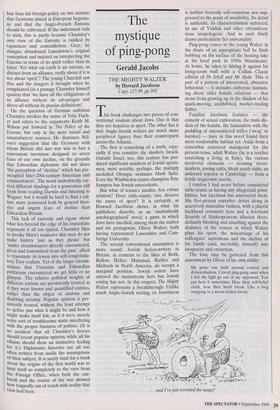The mystique of ping-pong
Gerald Jacobs
THE MIGHTY WALZER by Howard Jacobson Cape, £15.99, pp.388 his book challenges two pieces of con- ventional wisdom about Jews. One is that they are hopeless at sport. The other has it that Anglo-Jewish writers are much more peripheral figures than their counterparts across the Atlantic.
The first is something of a myth, espe- cially if you consider the modern Israeli. Outside Israel, too, this century has pro- duced significant numbers of Jewish sports- men, most notably, perhaps, the multiply medalled Olympic swimmer Mark Spitz. Even the Wimbledon tennis champion Pete Sampras has Jewish antecedents. But what of tennis's smaller, less robust relation? Does table-tennis, too, deserve the name of sport? It is certainly, as Howard Jacobson shows, in what his publishers describe as an 'unabashedly autobiographical' novel, a game in which Jews have excelled, among them the author and his protagonist, Oliver Walzer, both having represented Lancashire and Cam- bridge University. The second conventional assumption is more sound. Jewish fiction-writers in Britain, in contrast to the likes of Roth, Bellow, Heller, Malamud, Richler and Michaels in North America, do occupy a marginal position. Jewish writers have entered the mainstream here but Jewish writing has not. In this respect, The Mighty Walzer represents a breakthrough. Unlike much Anglo-Jewish writing, its Jewishness is neither brazenly self-conscious nor sup- pressed to the point of invisibility. Its detail is authentic, its characterisation unforced, its use of Yiddish and other circumlocu- tions unapologetic. And in such finely drawn particularity lies universality.
Ping-pong comes to the young Walzer in the shape of an appropriate ball he finds bobbing on the surface of the boating lake at his local park in 1950s Manchester. At home, he takes to hitting it against his living-room wall with a Collins Classic edition of Dr Jekyll and Mr Hyde. This is part of a pattern of introverted, obsessive behaviour — it includes elaborate fantasis- ing about older female relations — that stems from growing up in the shadow of his quick-moving, uninhibited, market-trading father.
Familiar Jacobson features — the comedy of sexual exploration, the male dis- dain of the female, the fascination with the peddling of unconsidered trifles (`swag' or tsatskes) — have in this novel found their most comfortable habitat yet. Aside from a somewhat contrived standpoint for the present-tense, adult Walzer (he is a teacher scratching a living in Italy), the various territorial elements — teeming street- markets, posing cafés, bleak youth clubs, an awkward sojourn in Cambridge — form a fertile tragicomic matrix.
I confess I had never before considered table-tennis as having any allegorical possi- bilities, but Jacobson has uncovered them. His first-person narrative drives along in assertively masculine fashion, with a playful backhand comment here and a forehand flourish of Shakespearean allusion there, defiantly blocking and smashing against the drabness of the venues in which Walzer plays his sport, the miscarriage of his colleagues' aspirations and the decline of his family (and, inevitably, himself) into incapacity and extinction.
The tone may be gathered from this assessment by Oliver of his own ability: My game was built around control and demoralisation. I loved ping-pong most when I felt the fight go out of my opponent. You can hear it sometimes. Hear their self-belief crack, hear their heart break. Like a twig snapping in a moon-frozen forest.
. . . and I've just invented the tango!'


























































 Previous page
Previous page